Vaccine ‘arrives in UK’ as US slams speedy approval
Despite being an early frontrunner, Pfizer’s COVID-19 vaccine has been pushed back by months following an unprecedented hiccup.
Coronavirus
Don't miss out on the headlines from Coronavirus. Followed categories will be added to My News.
Pfizer says it is still on track to supply Australia with 10 million doses of its COVID-19 vaccine in 2021 despite a major delay in production.
The roll out of COVID-19 vaccine programs around the world came into question after manufacturer Pfizer BioNTech revealed it can deliver only half of the global doses it promised in 2020.
The company makes one of three successful COVID-19 vaccines and is under contract to supply 10 million doses to Australia by early next year.
Health Minister Greg Hunt plans to start vaccinating Australians in March.
In July, Pfizer had promised to produce 100 million doses of the vaccine but now says it can only supply 50 million.
“This is consistent what we’ve previously shared in our external communications in November that we would supply up to 50 million,” a spokesperson for Pfizer Australia said.
“Based on current projections we expect to produce globally up to 50 million vaccine doses in 2020 and up to 1.3 billion doses in 2021.” the spokesperson continued.
There are several factors which have impacted the number of doses estimated to be available in 2020, the company said.
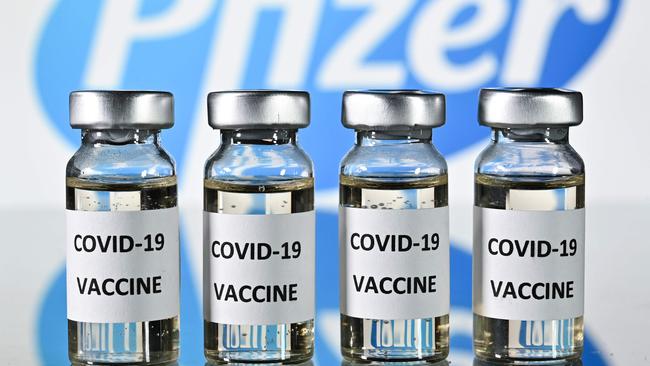
“Scale up of the raw material supply chain took longer than expected. And it is important to highlight that the outcome of the clinical trial was somewhat later than the initial projection, requiring us to focus additional efforts on clinical trial production,” the spokesperson said.
Modifications to the company’s our full-scale production lines in the U.S. and Europe are now complete and finished doses are being made at a rapid pace, the spokesman said.
“We are confident in our ability to supply at a pace of approximately 1.3 billion doses by the end of 2021, which includes the agreement to supply Australia with 10 million doses in 2021 dependent on clinical success and regulatory approval,” he said.
The statement came on Friday, after the Wall Street Journal revealed early batches of raw materials “failed to meet the standards”.
A Pfizer insider told the publication, “Some early batches of the raw materials failed to meet the standards. We fixed it, but ran out of time to meet this year’s projected shipments,’ a source told the WSJ.
“Scaling up the raw material supply chain took longer than expected,” a Pfizer spokesperson said.
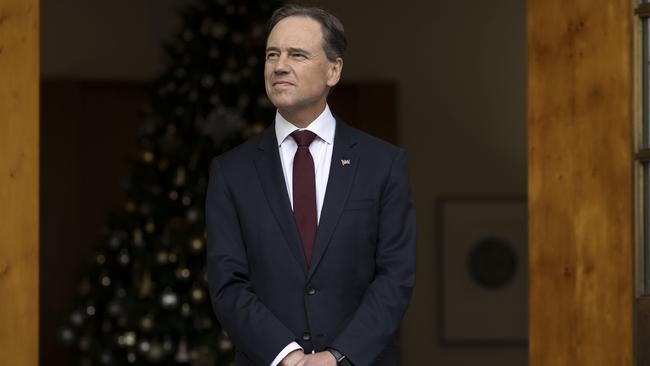
The revelation is a blow to the UK which fast tracked approval of the Pfizer vaccine and was set to start vaccinating citizens next week.
In addition to its Australian contract, Pfizer BioNTech is contracted to supply 40 million doses of the vaccine to the UK by the end of the year, and 40 million doses to the US. Now, the US will receive just 20 million.
The company has committed to supply up to 1.3 billion doses of the vaccine by the end of 2021.
Before the Pfizer vaccine can be used in Australia it must be approved by the Therapeutic Goods Administration (TGA), which is expected to happen by January 2021.
The TGA is still waiting on final results from Pfizer’s clinical trials, which found the vaccine was 95 per cent effective in preventing COVID-19.
The Pfizer vaccine is an mRNA vaccine which uses genetic code from the virus to prompt an immune response.
Two shots of the vaccine will be required three weeks apart.
This type of vaccine has never before been used in a widespread immunisation program, but has been tested on the elderly, children as young as 12 and nearly half those tested have come from ethnically diverse groups.
Its key disadvantage is it needs to be stored at minus 70-80 degrees Celsius.
To combat the difficulty, Pfizer is producing high tech eskys with GPS trackers to enable widespread transport of the vaccine.
Health Minister Greg Hunt plans to start vaccinating Australians in March, with the Pfizer vaccine expected to be among the first used.
Australia has contracts to purchase three other vaccines including the AstraZeneca shot, which last week reported it was 62 per cent effective if two full doses were given.
A smaller arm of the trial showed it was 90 per cent effective when given as a half dose followed by a full dose.
CSL is producing the AstraZeneca vaccine locally, with the first doses due to be ready around Christmas.
The University of Queensland vaccine and the Novavax vaccine, which will be supplied to Australia, are still in early stage clinical trials.
COVID VACCINE ARRIVES IN UK
The first COVID vaccine doses have arrived in the UK, according to reports.
The jabs are destined for a mystery location in the Midlands, in central England, where they will then be deployed to hospitals, reports The Sun.
It comes as America’s top doctor questioned whether Britain had been too quick to approve the Pfizer-BioNTech COVID-19 vaccine.
Boxes containing the doses travelled via the Eurotunnel to the UK today, the BBC reported.
From there the boxes will be taken to a hub in the Midlands before being distributed through a warehouse network that already supplies Britain’s National Health Service, The Guardian reported.
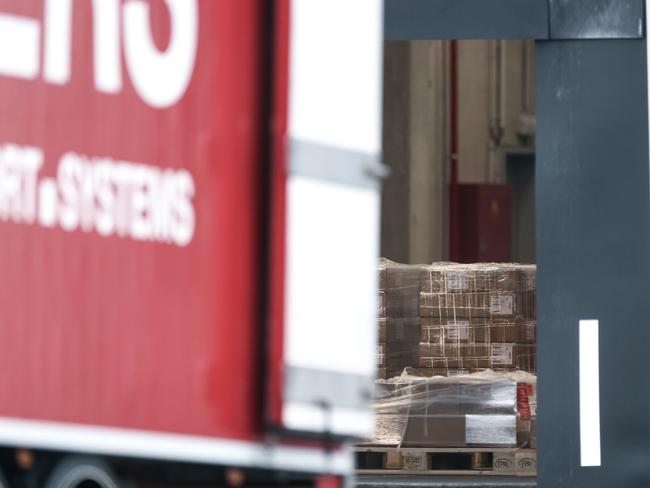
The exact pathway of the vaccines from Pfizers manufacturing plant in Puurs, Belgium, have remained secret.
Pfizer chiefs said this was to make sure the stock was safe from being targeted.
Ben Osborn, Country Manager, Pfizer UK, told a briefing: “We want to make sure we have a safe channel.”
He added: “There is a lot of scrutiny in terms of our transport.”
The vaccine vials must be stored at -70C to stop them spoiling, and so are transported in freezing cold boxes packed with dry ice.
Once the batches are taken out the box to defrost, they have to be stored at 2C to 8C. But they will only for five days.
There are fears the stock could be hijacked by criminal gangs on route for the purpose of selling the jabs on the black market.
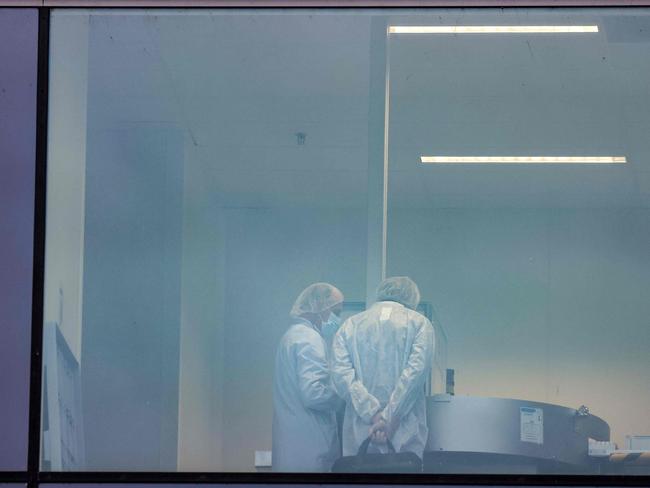
Earlier, Professor Van-Tam told the BBC the vaccine would arrive in “hours, not days.”
In total 53 NHS trusts are standing by to roll out the Pfizer Covid vaccine from next week, as early as Monday.
They have been chosen because they have super-cold freezers that are able to store the vaccines at -70C.
The trusts will act as “hubs” which will offer the jabs to people in their area in order of priority, as well helping with co-ordinating distribution.
A London hospital is expected to be the first to give out a COVID-19 vaccine at 7am on Monday morning, The Telegraph reported.
The unnamed hospital is one of seven in the capital to receive batches of the Pfizer jab over the weekend, after it was approved by regulators.
It could be Croydon University Hospital, Guy’s & St Thomas’ NHS Trust, Kings College, Princess Royal University Hospital, Royal Free, St George’s University Hospitals or University College Hospitals.
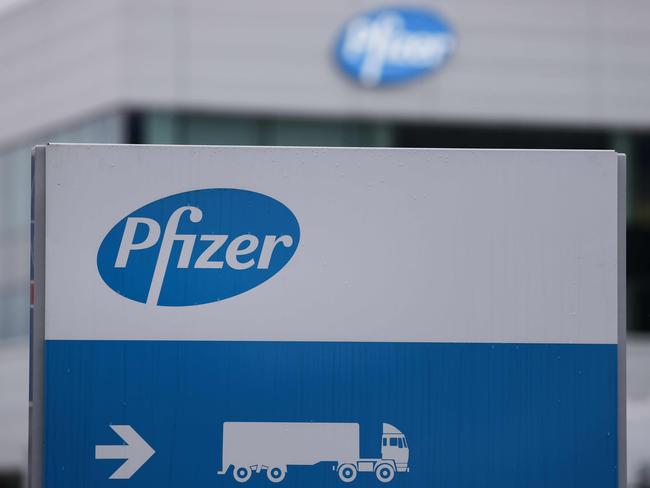
Professor Van-Tam said he expects the Oxford University jab to be given the green-light before Christmas.
Speaking to the BBC, he said: “I’m hopeful that will happen but that’s entirely out of my hands.”
Ultimately it comes down the decision of the MHRA, the UK regulatory body, which is currently reviewing data on the vaccine.
“If it takes them a few weeks, or a few months, that’s fine,” JVT said.
“They have to get it right on efficacy, safety and the quality of the product.”
Oxford University announced on in late November that its vaccine prevented people from being infected with the coronavirus.
The jab prevented 70 per cent of people, on average, from picking up the virus, depending on their dose regimen.
All the trial data has been handed to regulators who will decide whether or not the jab is effective enough, and safe, to use.
This could take as little as two weeks, based on how quickly the process took for the Pfizer jab.
The Pfizer vaccine, made with BioNTech company, was approved for use on Wednesday (local time), after the trial results were made public on November 18.
It means the UK is the first country in the world to have an approved vaccine.
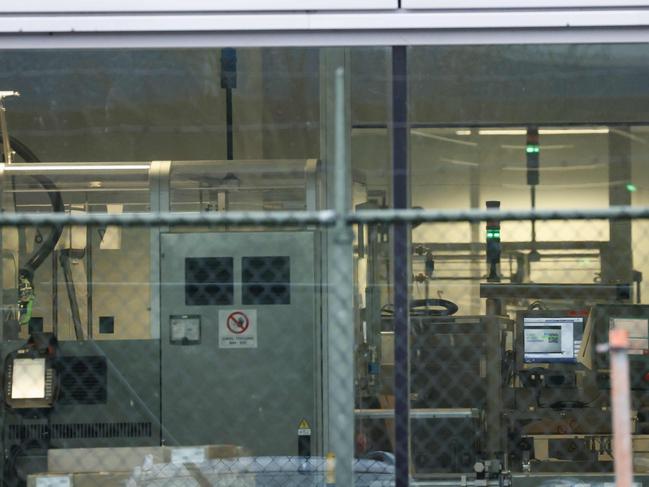
TOP US DOC SLAMS UK OVER SPEEDY APPROVAL
Meanwhile, America’s top doctor, Dr Anthony Fauci, said British health regulators did not scrutinise trial data as carefully as the US Food and Drug Administration before approving the use of Pfizer’s coronavirus vaccine, according to a report.
“The way the FDA is, our FDA is doing it, is the correct way,” Dr Fauci, director of the National Institute of Allergy and Infectious Diseases, told Fox News, according to CNN.
“We really scrutinise the data very carefully to guarantee to the American public that this is a safe and efficacious vaccine,” Dr Fauci said.
“I think if we did any less, we would add to the already existing hesitancy on the part of many people to take the vaccine because they’re concerned about safety or they’re concerned that we went too quickly,” he added.
The top US infectious diseases doctor said it was important for Americans to feel good about a potential vaccine against the deadly bug.
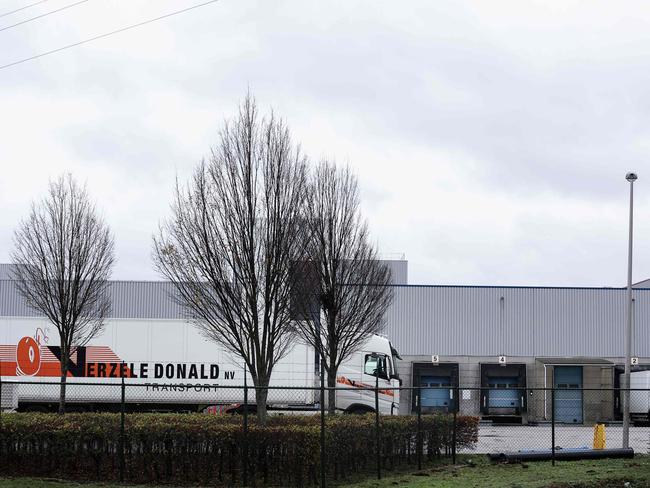
“So, it’s almost a ‘damned if you do and you’re damned if you don’t,’ because if you go quickly and you do it superficially, people are not going to want to get vaccinated,” he said.
“We have the gold standard of a regulatory approach with the FDA. The UK did not do it as carefully and they got a couple of days ahead,” he said. “I don’t think that makes much difference. We’ll be there. We’ll be there very soon.”
According to the New York Post, Dr Fauci’s comments came after the White House said it wasn’t notified before Britain gave the green light for the jab — an unexpected move that put it at least a week ahead of the US in dispensing the vaccine developed by Pfizer, a US drugmaker, and Germany’s BioNTech.
The FDA isn’t scheduled to consider authorising emergency use of the vaccine until December 10.
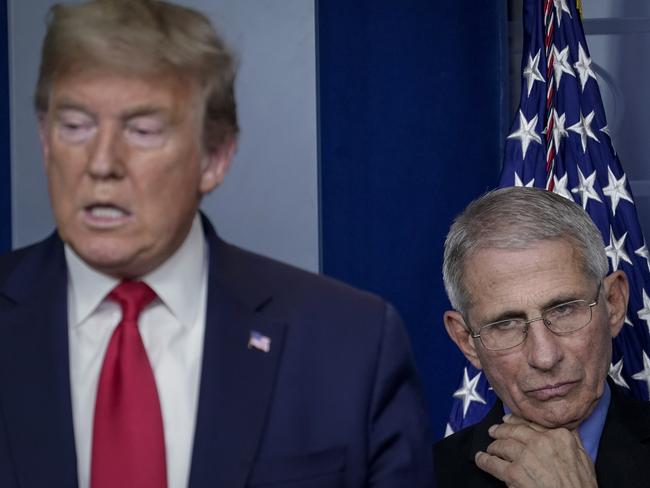
US President Donald Trump has been demanding to know why the FDA isn’t moving faster to approve the shot, according to Politico.
FDA Commissioner Stephen Hahn defended the agency’s review process, saying a thorough vetting is required to make sure the public believes in the vaccine’s safety and effectiveness.
Hahn told the Wall Street Journal that the FDA has had 150 people working days, nights and weekends to review the test data submitted by Pfizer and BioNTech.
“We realise there is an issue in the US around vaccine hesitancy. There have been concerns raised about the speed with which COVID-19 vaccines have been developed,” Mr Hahn told the Wall Street Journal
“This will meet our gold standard of safety and efficacy that the American people have come to trust,” he added.
BIG GUNS COME IN TO HELP WITH VACCINE PUSH
It comes as fears that many Americans will simply refuse to take the COVID vaccine have prompted three former US Presidents to pledge to take the jab on live TV to show the public that it is safe.
Barack Obama, George W. Bush and Bill Clinton have all volunteered to get the coronavirus vaccine live on air to overcome concerns that it has been rushed through approvals and may not be completely fit for humans.
UK Prime Minister Boris Johnson was also said to be considering getting the vaccine on live TV.
Polls in the US – the country hit hardest by the virus with more than 270,000 people dead – have shown consistently than many Americans say they won’t take the vaccine.
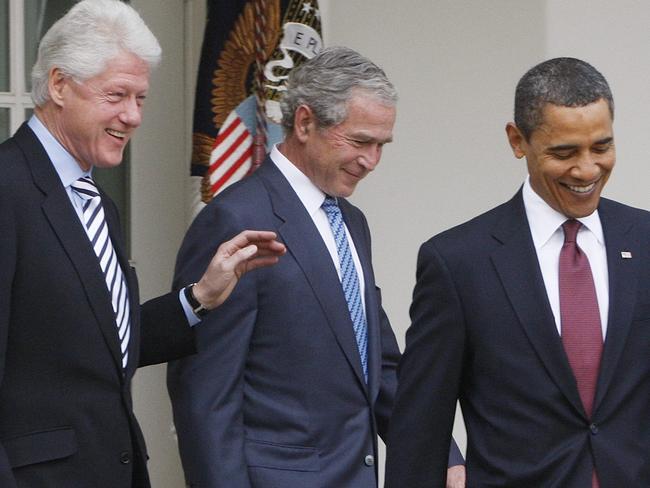
The move from the three former US Presidents comes as 42 per cent of people have said they won’t take a shot – even after it’s been given the green light by the FDA.
But Mr Obama said he would volunteer to get the jab on-air.
“I may end up taking it on TV or having it filmed, just so that people know that I trust this science, and what I don’t trust is getting Covid,” Mr Obama said.
He said he trusts health experts like Director of the National Institute of Allergy and Infectious Diseases Dr Anthony Fauci “completely” to approve a safe COVID-19 shot.
“If Anthony Fauci tells me this vaccine is safe, and can vaccinate, you know, immunise you from getting Covid, absolutely, I’m going to take it,” Mr Obama said.
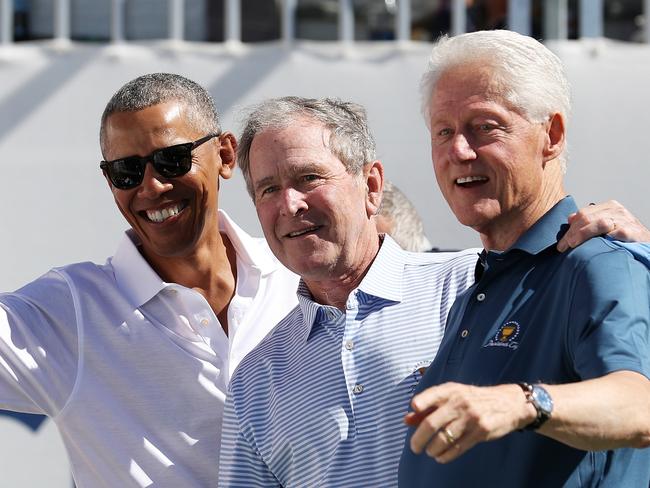
Meanwhile, Mr Bush’s chief of staff Freddy Ford told CNN that the 43rd president reached out to top White House coronavirus experts Dr Fauci and Dr Deborah Birx to see how he could promote the vaccine, The Sun reported.
“First, the vaccines need to be deemed safe and administered to the priority populations,” Mr Ford said.
“Then, President Bush will get in line for his, and will gladly do so on camera.”
Mr Clinton’s press secretary Angel Urena said that once a shot is available, the former president will “definitely” get a shot.
“And he will do it in a public setting if it will help urge all Americans to do the same,” Urena said.
The former US Presidents’ willingness to get a jab and encourage others comes as many Americans are hesitant.
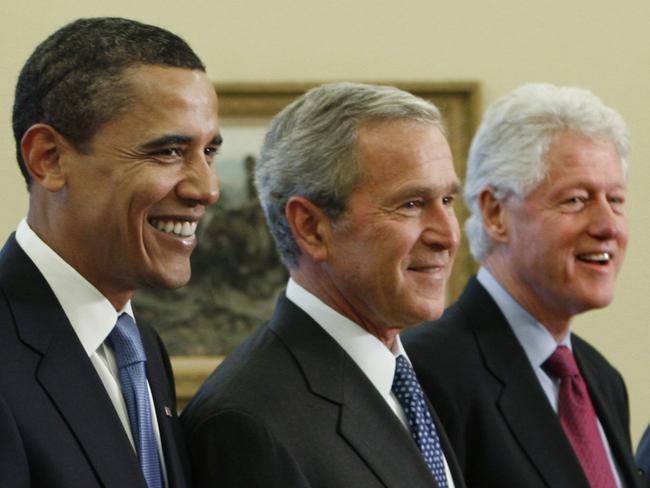
According to a Gallup poll published in mid-November, 58 per cent of Americans said they would be willing to get a vaccine.
The 42 per cent of respondents who said they would not get a shot is a decline from a 50-50 split in mid-September.
With two-fifths of respondents saying they were hesitant to get the jab, however, it proves possible obstacles for health experts who are pushing for widespread rollout in an effort to get the pandemic under control.
The US is now seeing more than 200,000 new cases every day with total cases closing in on 14 million.
Pfizer and Moderna have both applied for emergency FDA approval of their vaccines in the US, while the UK is said to be ready tio begin the first shots next week.
Pfizer is set to have a public hearing on December 10, while Moderna will have theirs on December 17.
If given the green light, the companies may start vaccine rollout within just days of their hearings.
Health officials will be forced to ration shots, however, as the number of vaccines will be limited in early months and officials will be forced to determine who is highest priority to receive them.
AUSTRALIA ON TRACK TO ROLL OUT CORONAVIRUS VACCINE IN MARCH
Australia is on track to roll out a coronavirus vaccine in March, after the UK announced the Pfizer candidate has been approved for use “from next week”.
The Pfizer and BioNTech jab, of which Australia has ordered 10 million doses, passed a safety review in the UK, which was announced on Wednesday night.
Australia signed a deal for the Pfizer jab in a late bet in November, shortly before its results were announced.
The British approval is a significant moment in the fight against coronavirus, which is still ravaging the UK, with almost 60,000 lives lost there so far.
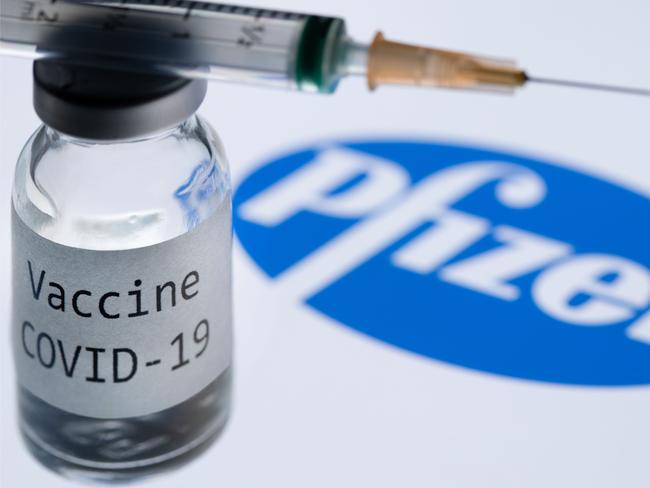
The news emerged as British Prime Minister Boris Johnson was said to be considering taking a coronavirus vaccine live on television, as a war of words broke out over Britain’s speedy approval of the Pfizer jab.
The UK fast tracked its approval process to become the first in the world to sign off on a COVID-19 vaccine.
The mRNA jab needs to be stored in dry ice at -70 degrees, but the UK has already been working on vaccination centres to speed up its rollout.
Federal Health Minister Greg Hunt said “today was an important step for the world.”
“I have again spoken to the Australian CEO of Pfizer, they remain on track for vaccine delivery once it is approved for use in Australia by the independent regulator,” Mr Hunt said.
“Our advice remains that the timeline for a decision on approval is expected by the end of January 2021, and our planning is for first vaccine delivery in March 2021.
“Safety is our number one priority and Australia is well placed for a thorough, but rapid safety assessment and early rollout of a free, voluntary but entirely universally available COVID-19 vaccine program.”
Britain’s Health Secretary Matt Hancock said that the UK was the first country in the world to have a “clinically authorised vaccine” to roll out.
“This is fantastic news. The MHRA (Medicines and Healthcare products Regulatory Agency, the fiercely independent regulator, has clinically authorised the vaccine for rollout,” he said on Sky News UK.
“From early next week we will start the program of vaccinating people against COVID-19 here in this country.”
The news came on the day that England lifted some of its lockdown conditions in the lead up to Christmas.
George Brandis, Australia’s High Commissioner in the UK, said it was “brilliant news.”
The UK has ordered 40 million doses of the Pfizer vaccine, with health workers and the elderly to be prioritised.
However, the announcement was a crack of light for Australians stranded in the UK.
Those who do get vaccinated may be able to avoid the need for hotel quarantine on return, depending on the speed of the rollout.
Australia ordered 10 million doses of the Pfizer jab, which on November 18 reported results of 95 per cent effectiveness in preventing COVID-19.
However its main orders are of the Oxford University candidate, which has ordered additional studies to check its claims that it had up to 90 per cent effectiveness.
A trial, which involved a half dose and then full dose, which showed higher results, had a limited number of participants.
Australia is also behind a University of Queensland vaccine which is still in trial stages.
BORIS MAY TAKE JAB ON LIVE TV
Boris Johnson was considering taking a coronavirus vaccine live on television, as a war of words broke out over Britain’s speedy approval of the Pfizer jab.
The UK fast tracked its approval process to become the first in the world to sign off on a COVID-19 vaccine.
Allegra Stratton, Mr Johnson’s new White House-style spokeswoman, said there was a chance that the prime minister would become a guinea pig to improve confidence in the virus.
“We all know the character of the prime minister, I don’t think it would be something that he would rule out,” Ms Stratton said.
“But what we also know is that he wouldn’t want to take a jab that should be for somebody who is extremely vulnerable, clinically vulnerable, and who should be getting it before him.”
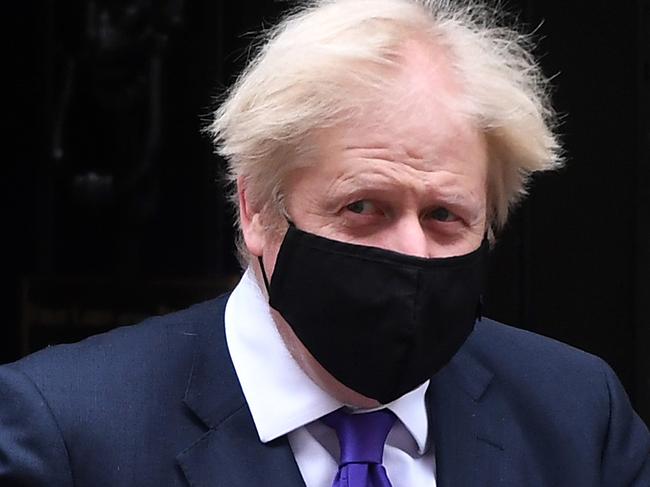
The vaccine will be given to people from next week, with 800,000 doses already on the way to the UK from a factory in Belgium.
Millions of people in Britain will get access to the jab, which requires two doses to be taken 21 days apart, in December.
However, it will be a logistical nightmare because it must be stored at -70 degrees and comes in batches of almost 1000, making it hard to distribute in nursing homes.
Australia has ordered 10 million doses of the Pfizer vaccine, in a late bet in November, which were likely to be available from March.
Mr Johnson said scientists had found the answer to stop the “invisible enemy” that had claimed 1.5 million lives across the world.
“And now the scientists have done it, and they have used the virus itself to perform a sort of biological jiu jitsu to turn the virus on itself in the form of a vaccine,” he said.
The first phase of the vaccination program, which targets health workers, those with existing health problems and those over 50, would stop 99 per cent of preventable deaths, according to the UK’s deputy chief medical officer Professor Jonathan Van Tam.
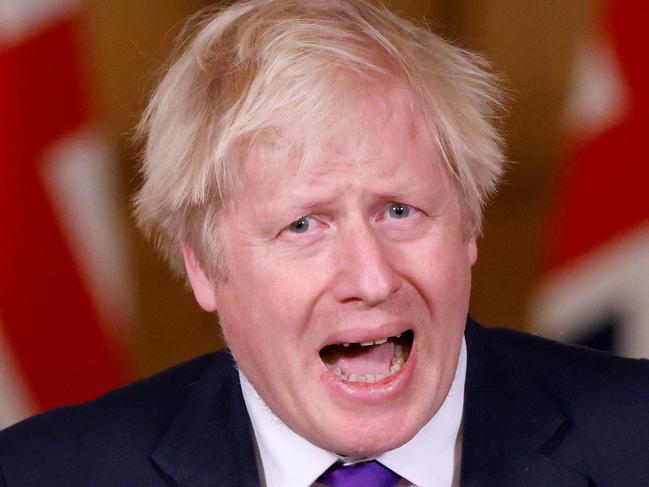
Britain won the race to approve the Pfizer and BioNTech jab after its regulators were given early access to data to speed up the process.
The mRNA vaccine, which was developed in Germany, was yet to be given the green light in Europe.
The European Union wants to get all member countries to sign off and roll out the vaccine at once, delaying the approval time frame.
The avoidance of red tape was hailed as a benefit of Brexit, with the UK able to sidestep the group’s rules.
Germany’s Health Minister Jens Spahn said that European Union countries had decided against a fast tracked authorisation.
“We have member states, including Germany, who could have issued such an emergency authorisation if we’d wanted to,” he said.
“But we decided against this and what we opted for was a common European approach to move forward together.”
The spat comes as Brexit talks continue this week, with the threat of economy-wrecking no deal scenario likely if a compromise cannot be reached.
Britain will leave the EU on December 31 even if a deal cannot be ironed out, which could cause border chaos and claim even more jobs when the world economy was already on its knees.
EUROPEAN COUNTRIES GET TIMEFRAME
European countries were given a clear time frame for the start of their vaccination programs after the bloc’s medicines regulator said it will decide by December 29 whether to grant emergency approval for the first COVID-19 jabs.
The news came as America’s Centre for Disease Control (CDC) was set to meet to decide what groups of people will receive the first vaccination shots in the US.
France plans to begin by targeting the most fragile and exposed groups in early 2021, followed by a second campaign for the rest of the population between April and June, President Emmanuel Macron announced.
Germany has already said it is hoping to launch its immunisation drive in the first quarter of 2021 and is preparing vaccination centres across the country.
Meanwhile in the US, White House chief of staff Mark Meadows met with White House Food and Drug Administration Commissioner Stephen Hahn to discuss the speed of COVID-19 vaccine approval by the agency as US infections surge.
Pfizer and partner BioNTech applied for emergency approval for a coronavirus vaccine candidate on November 20, but the FDA didn’t schedule an approval meeting until December 10. Clinical trials found the vaccine is about 95 per cent effective and has no serious safety issues, the companies said.
Another company, Moderna, applied for emergency approval for a vaccine candidate on Monday. The FDA scheduled a meeting 18 days later on December 17 for its Vaccines and Related Biological Products Advisory Committee. Moderna says its vaccine also has about 95 per cent effectiveness.
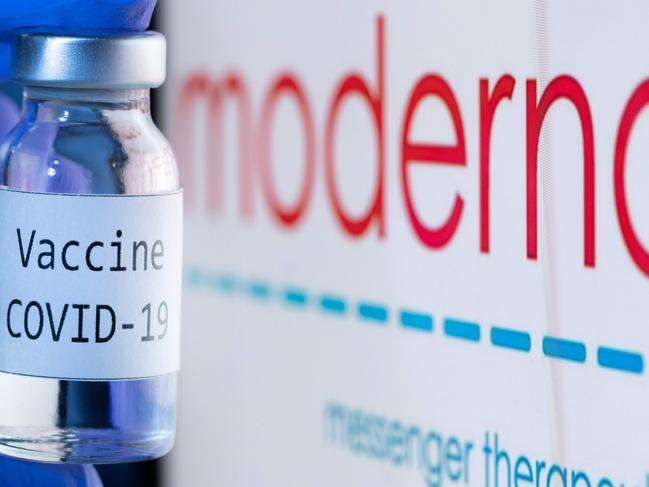
A senior Trump administration official said, “There are some who are complaining the FDA is not working around the clock to get things approved and because of that, Meadows has asked Dr Hahn for a briefing.”
One source accused Dr Hahn of going on vacation in November as the companies raced to submit vaccine applications.
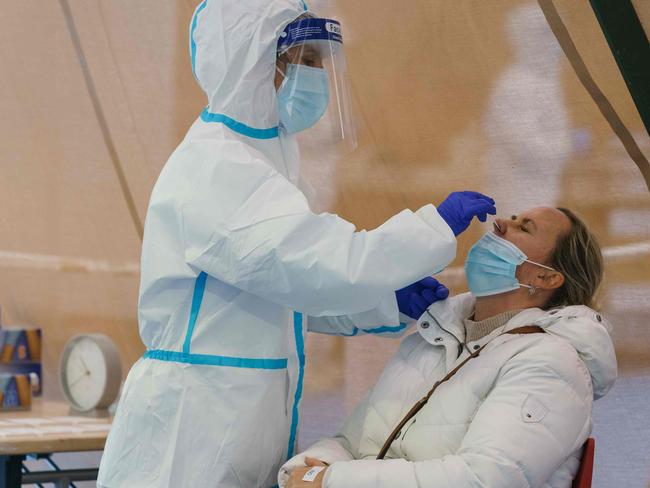
HUGE BOOST TO VIRGIN DOMESTIC FLIGHTS
Virgin Australia is expecting close to 80,000 additional seats will be added to its east coast flight routes by January 2021.
As Queensland opens its borders to Victoria and Sydney, the country’s second airline carrier says it is anticipating an extra 78,000 seats per week will be available on flights between the three major eastern capital cities.
With coronavirus restrictions easing across most of the nation, Virgin said it believes its capacity will be at 60 per cent of pre-pandemic levels.
It also noted on Tuesday flights from Victoria and NSW to Queensland are at near capacity, with high demand stretching through for the rest of the month.
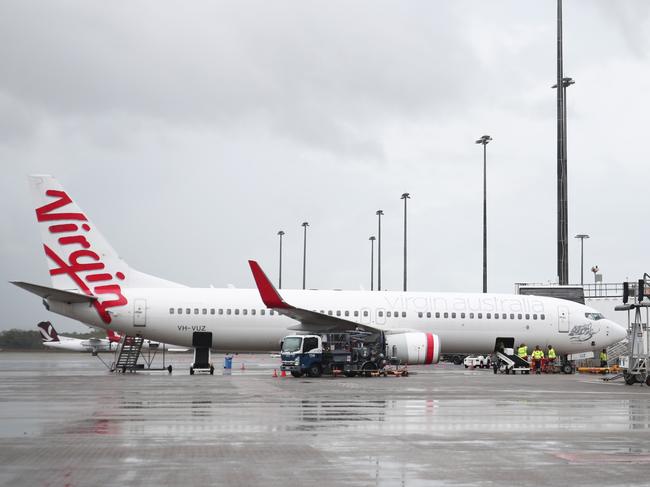
Virgin Australia chief executive Jayne Hrdlicka said the decision by the Queensland government to open borders will mean families will be able to reunite for the holiday season.
“We’re seeing strong demand throughout December across all of our Queensland services from Victoria and New South Wales, so we know many Australians have been itching to visit Queensland to reunite with their loved-ones or do business,” Ms Hrdlicka said.
“The broader economic contribution that open borders will bring cannot be underestimated in what has been the most difficult year for many businesses, particularly in the tourism and hospitality industries.”
‘WE HAVE A VACCINE’
Hopes for a first wave of vaccinations before the end of 2020 received a boost with US firm Moderna saying it was filing Monday local time for emergency authorisation of its COVID-19 vaccine in the United States and Europe.
After top US scientists warned Americans to brace for a “surge superimposed on the surge,” Moderna reported full results had confirmed a high efficacy estimated at 94.1 per cent.
It was set to join American pharmaceutical maker Pfizer and Germany’s BioNTech, which applied for similar approvals last week, and have predicted their vaccine could be greenlit in the US shortly after December 10.
If the US Food and Drug Administration agrees Moderna’s product is safe and effective, the first of the drug’s two doses could be injected into the arms of millions of Americans by the middle of December.
“We believe that our vaccine will provide a new and powerful tool that may change the course of this pandemic,” said Moderna CEO Stephane Bancel.
Health Secretary Alex Azar told CBS News: “We could be seeing both of these vaccines out and getting into people’s arms before Christmas.”
Co-developed with the US National Institutes of Health, the jabs were generally well tolerated, with the most common side effects including injection site pain, fatigue, muscle pain, joint pain and headache.
Moderna expects to have approximately 20 million doses of the vaccine, called mRNA-1273, available in the US by the end of the year, and between 500 million to a billion doses globally in 2021.
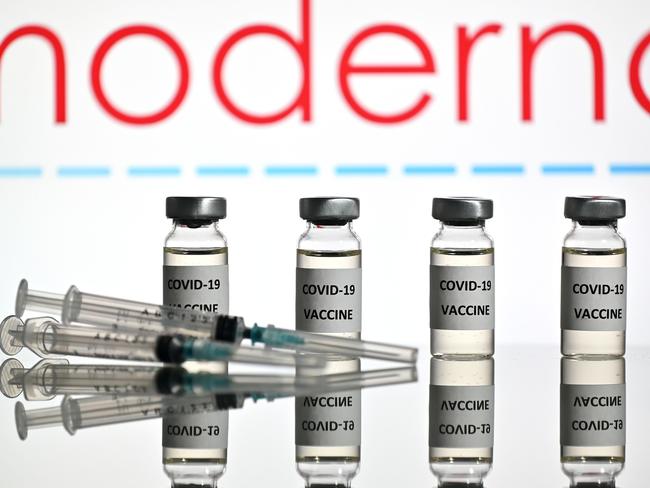
INSIDE THE GLOBAL VACCINE RACE
It took just 303 days to develop and test the first vaccines against COVID-19 but a global vaccine coalition wants to speed that up to just 100 days when the next pandemic strikes.
And some vaccines may not even need a needle to be administered — nasal sprays, skin patches and electrical pulses are all being trialled as delivery methods.
In the past, the fastest vaccine ever produced took four years to get off the ground.
The philanthropic group CEPI which helped fund the development of three of the first successful COVID-19 jabs met its initial target to have a candidate vaccine ready for testing within 16 weeks of the disease’s genetic code being sequenced.
Next time it wants to do even better.
“Well one of the things CEPI is talking about is could we have 100 days as a reasonable objective,” said CEPI representative and former Australian Health Department chief Jane Halton.
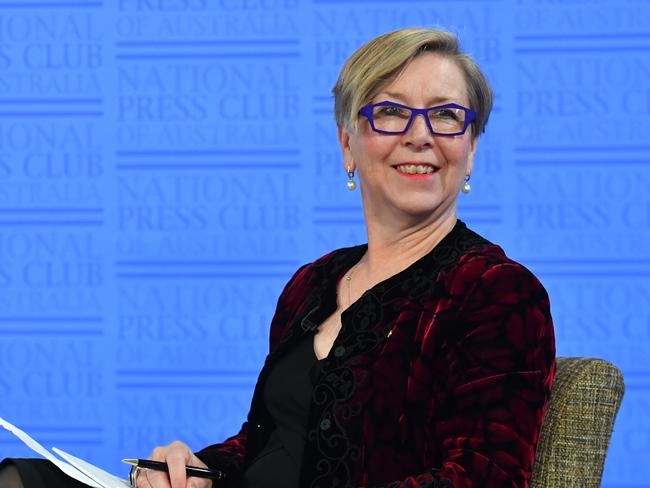
She said the legacy of COVID-19 is a series of new plug and play technologies that will speed up vaccine development against future pandemics.
Traditionally vaccines were based on weakened or harmless versions of the agent that caused the disease, which take a long time to make.
The flu vaccine takes six months to update every year because the new strains have to be grown for weeks then injected into hens’ eggs, duplicated, harvested and killed.
Pfizer and Moderna’s COVID-19 vaccines use a revolutionary new method involving a single-stranded RNA molecule (mRNA), made using a chemical process rather than a biological one as in the flu vaccine.
This means it can be scaled up and mass produced much faster.
Within days of the genetic code of the virus that causes COVID-19 becoming available scientists at these labs were able to produce the mRNA code for vaccine testing.
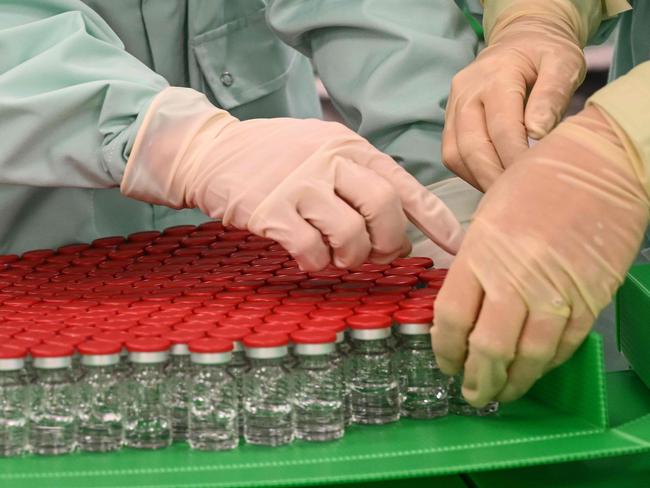
In future pandemics the same platform could be used again and scientists would simply plug in the mRNA code from whatever new pathogen emerges.
These types of vaccines had never been involved in large scale human clinical trials before and the proof they worked so well — preventing over 90 per cent of cases of serious disease — is a huge scientific win.
The problem is they need to be kept at super-low temperatures which makes their distribution problematic. Work is underway to see if they can be freeze dried and perhaps administered using a skin patch
The Oxford/AstraZeneca vaccine uses another plug and play platform, called ChAdOx1, based on a chimpanzee adenovirus, similar to the virus that causes a common cold in humans.
The Oxford team used this virus as a carrier and added it to the DNA sequence for the spike protein from the virus that causes COVID-19.
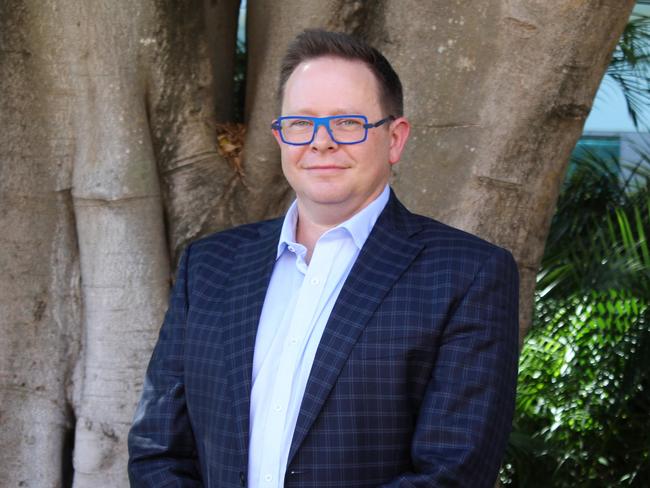
Using funding from CEPI, the Oxford group had previously tested ChAdOx1 vaccines against MERS, flu and tuberculosis and knew it worked. This allowed them to quickly transition over to making the COVID-19 vaccine.
The other factor in vaccine speed is the vast amounts of money that allowed the vaccine makers to run several different clinical trial stages simultaneously and ramp up production of the vaccines even before they knew they worked.
“Normally at every stage when the phase one trial is complete, you’re scrambling for funds to fund the phase two, and it’s only when that is compliant that we can try and access funds for the phase three,” Nucleus Network’s Paul Griffin, who is running clinical trials on four COVID-19 vaccines, said.
– with staff writers



